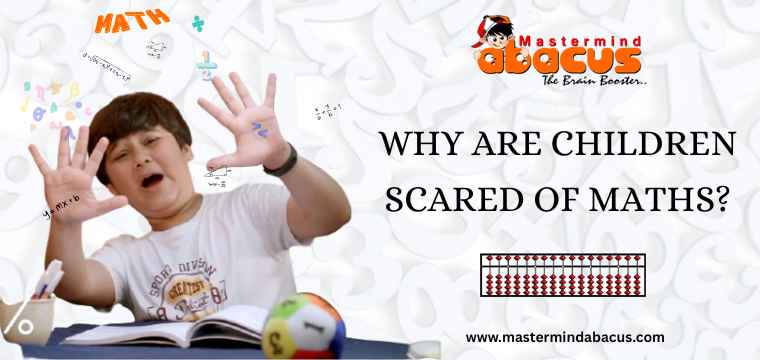
Why Are Children Scared of Maths?
A Story That Might Sound Familiar
It was a regular evening. Meena sat beside her 8-year-old son, Aarav, trying to help him with his math homework. But within minutes, Aarav’s eyes filled with tears.
I just don’t get it, Mama,” he whispered, pressing his pencil into the page so hard that it almost tore. “I try, but the numbers... they don’t make sense.
Meena's heart broke. Aarav was bright, talkative, and curious about the world. But when it came to math, he shut down. His hands would sweat before math tests. He would avoid eye contact in class when the teacher asked questions. He even began saying things like, “I’m just not a maths kid.
Meena felt helpless. How did a subject filled with logic and patterns turn into a source of stress and fear?
If you’ve ever seen your child struggle like this, you’re not alone.
Why Are Children Scared of Maths?
Many children between the ages of 5 to 14 feel anxious or even fearful when it comes to learning maths. But why? Let’s understand this from a child’s point of view:
1. Numbers Feel Like Puzzles with No Picture
Unlike a story or a drawing, numbers are abstract. Children can’t "see" numbers in the same way they see a toy or a tree. For many kids, numbers are just marks on a page—cold, confusing, and emotionless.
2. Math Feels Disconnected from Real Life
Children love what they can touch, feel, and relate to. When they don’t see how math connects to their daily world—like sharing chocolates, playing games, or shopping with mom—it becomes a subject they simply “have to” learn, not something they want to learn.
3. Fear of Being Wrong
Math often comes with the idea that there’s only one right answer. Children fear being judged, laughed at, or feeling stupid when they get an answer wrong. This pressure can build anxiety and even make a confident child doubt themselves.
4. Rigid Teaching Methods
In many schools, math is taught in a strict, step-by-step method that leaves little room for fun or creativity. Sitting at a desk, solving similar problems again and again, can feel boring or frustrating for a child who learns best through movement or play.
How Can We Remove Math Fear in Children?
As parents, we play a powerful role in changing how our children feel about maths. Here are four simple yet powerful ways to remove math fear and build a joyful connection:
1. Make Numbers a Game
Turn learning into fun. Use board games, number songs, puzzles, and even kitchen time to play with math. Counting steps, sharing fruits equally, or measuring ingredients—all are math moments! When children play with numbers, they understand numbers.
2. Use Hands-On Tools Like Abacus and Flash Cards
Visual tools make abstract ideas real. The abacus, for example, helps children see and touch numbers. It builds strong mental math skills while also training both sides of the brain. Flash cards, blocks, and number lines make learning active and exciting.
3. Connect Math to Everyday Life
Let your child help while shopping: ask them to count money, compare prices, or weigh vegetables. Use clocks to teach time, or ask them to split snacks between siblings. These real-life connections make math meaningful and memorable.
4. Encourage Without Pressure
Avoid saying, “You should know this!” Instead, say, “Let’s figure this out together.” Celebrate effort, not just correct answers. Your calm support helps your child feel safe, and safety is the first step to learning.
The Beautiful Benefits of Joyful Math Learning
When math is taught with love and creativity, it becomes more than just a subject. It becomes a tool for life. Here are just a few lifelong benefits:
1. Boosts Logical Thinking
Math trains the brain to look for patterns, solve problems, and think critically. These are skills children will use in every area of life—not just exams.
2. Improves Memory and Focus
Mental math exercises strengthen concentration and memory. Regular practice with tools like the abacus improves brain coordination and speed.
3. Builds Confidence and Curiosity
When children start understanding math, they stop fearing it. Confidence in math leads to curiosity—"Can I solve more?", "Can I do it faster?"—and this mindset helps them succeed in school and beyond.
4. Prepares for Future Success
Math is a part of everything: from science and technology to cooking, budgeting, and building a career. When children love math early, they grow into adults who use it easily and confidently.
Mastermind Abacus — A Gentle Yet Powerful Solution
At Mastermind Abacus, we understand the emotional side of learning. Our specially designed Abacus classes for kids help children:
Turn fear into fun
Visualize numbers through beads
Sharpen focus and memory
Improve mental math speed without pressure
Our approach is warm, playful, and brain-boosting. Children as young as 5 begin to see maths not as a monster, but as a magical world they can explore.
With Mastermind Abacus, your child will:
Develop both the left and right sides of the brain
Gain speed and accuracy in mental math
Build lasting confidence in numbers
Learn through colorful, hands-on tools and exciting activities
And the best part? All this happens in a stress-free, joyful environment—online or offline.
You Can Change the Story
Remember Aarav from the beginning of this blog? After joining Mastermind Abacus, his journey changed.
Now, Aarav looks forward to his Abacus class. He smiles when he solves problems. He even helps his younger sister count using her toy blocks. His fear is gone—and his confidence is blooming.
Your child deserves the same.
Let’s make maths a friend, not a fear.
Join thousands of happy parents and curious learners who’ve discovered the power of joyful learning with Abacus.
Share the Joy
If this blog touched your heart or made you think of another parent whose child might be struggling, please share it on WhatsApp or social media. A small step from you might be a big step for another child.





